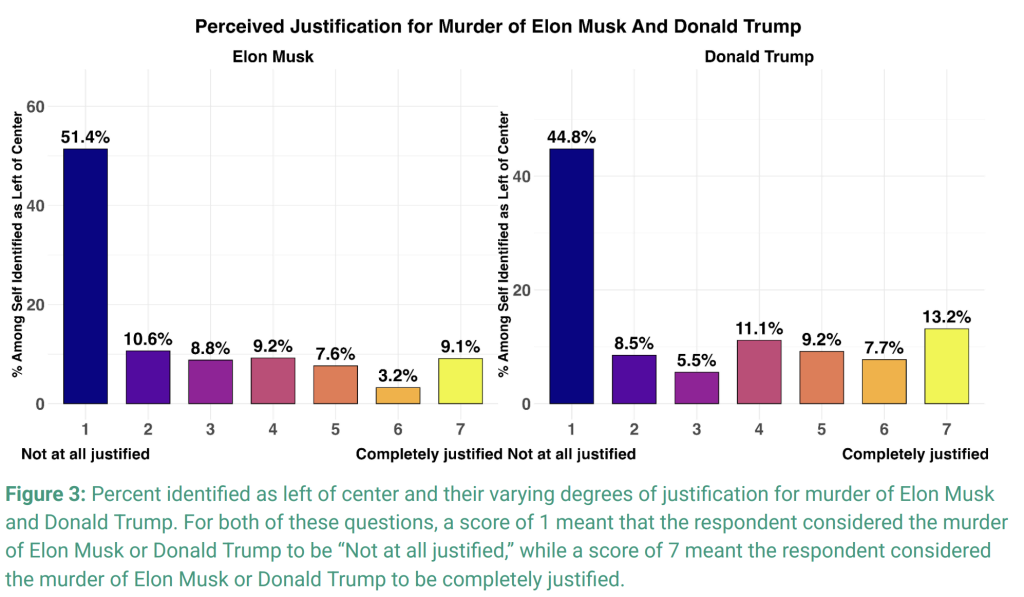Emerging "Assassination Culture": Disturbing Results of the NCRI Study
A Worrying Trend Revealed
A recent study conducted by the Network Contagion Research Institute (NCRI) highlights a troubling shift in American attitudes toward violence and political discourse. According to the findings, an alarming number of respondents seem willing to rationalize or endorse extreme acts of aggression, including the idea of killing public figures such as Elon Musk and Donald Trump. Even more concerning, a segment of the population appears to find it acceptable to damage Tesla outlets as a form of protest.
Understanding the NCRI Study
The NCRI’s research specifically aimed to gauge support for political violence among U.S. residents. The organization has expressed concern over the increasing normalization of violent rhetoric directed toward figures like Musk and Trump. The study reveals that physical property damage—such as attacks on Tesla shops and Supercharger stations—has also found disturbing acceptance among some groups.
Methodology of the Study
To achieve a representative view, the NCRI surveyed 1,264 U.S. residents across various demographics—including race, ethnicity, gender, age, and education level. Participants answered questions that ranged from their political affiliation to their views on violence and other sociopolitical scales, providing a comprehensive assessment of public sentiment.
Shocking Statistics on Political Violence
The study unveiled particularly troubling statistics: 57.6% of left-leaning respondents deemed the destruction of Tesla dealerships "partially acceptable." Perhaps of greater concern, 48.6% of those on the political left suggested that if someone were to kill Elon Musk, it might be justified. This sentiment rose even higher for Donald Trump, where 55.2% of respondents believed an assassin’s act against him could find some level of justification.
Broader Context of Acceptance
When looking beyond those who identified as left-leaning, the study highlights that 39.8% of all respondents still found the destruction of Tesla stores somewhat acceptable. About 31.6% deemed the killing of Elon Musk justifiable, while 38.5% considered the same for Donald Trump. These numbers illustrate a worrisome trend that crosses political boundaries.
Graphical Representation of Study Findings
The NCRI provided visual data to encapsulate the shocking results pertaining to various groups within the American populace. In one revealing chart, the distinct responses from left-leaning individuals contrasted against the broader survey results, underscoring the potential divide in public opinion on violence and protest.

Insights from NCRI Leadership
The NCRI’s lead author, Joel Finkelstein, emphasized the rise of what he terms an "assassination culture." This phenomenon has gained troubling visibility, especially following the 2024 death of UnitedHealthcare CEO Brian Thompson, who was stabbed by Luigi Mangione. Finkelstein argues that societal acceptance of such violent rhetoric is no longer confined to the fringes of debate.
Cultural Shifts in Acceptability
"What used to be culturally taboo has shifted," Finkelstein remarked. "We are witnessing a pronounced change in language surrounding the assassination of public figures — what was previously unthinkable is now cloaked in meme culture and game-like online dialogues." This alarming evolution reflects a decline in discourse boundaries and raises questions about societal norms.
Social Media’s Role in Normalizing Violence
Social media has played a pivotal role in shaping this "assassination culture." Finkelstein pointed out that platforms have provided a megaphone for extreme viewpoints, removing the barriers that once limited violent rhetoric in public discourse. The ability for users to condone violence against public figures online has contributed to the perception that such thoughts and actions are becoming acceptable.
The Response from Political Figure Supporters
Supporters of both Musk and Trump have responded with alarm to these findings. Many argue that as these discussions enter the mainstream, they not only threaten public figures but also undermine the foundations of democracy itself. The normalization of violence, they contend, could spill over into targeted attacks, creating a dangerous precedent for future political discourse.
Impact on Political Dynamics
As these sentiments take root, they could exacerbate existing political divides in the United States. Analysts warn that acceptance of violence could further polarize the electorate, leading to a cycle of retribution and hostility. Conversations about accountability and justice for political disagreements are slipping into discussions of outright violence.
Implications for Civic Engagement
The NCRI study raises serious concerns about the role of civic engagement in a democracy. If groups increasingly rationalize violent forms of protest, it could discourage constructive dialogue and peaceful activism. Instead, citizens may find themselves trapped between polarized extremes, increasingly alienating moderate voices.
Calls for Action and Reflection
Following the release of the NCRI’s findings, calls for action have emerged from various political and social organizations aimed at countering this disturbing trend. They urge for educational initiatives focused on conflict resolution and peaceful advocacy, designed to re-establish norms of civility in political discourse.
Looking Toward the Future
As this cultural shift unfolds, it remains crucial for society as a whole to engage in self-reflection and critical thinking about the implications of endorsing political violence. Public figures, educators, and community leaders must rise to combat the creeping acceptance of aggression in political discussions.
Conclusion: A Call for Unity Against Extremism
The findings of the NCRI study spotlight an urgent need for reflection on the morality of political discourse in America. As the lines blur between dissent and violence, it becomes imperative for individuals and communities to safeguard their principles against harmful ideologies. Promoting empathy, understanding, and respect in political conversations could nurture a healthier democracy for all. As a society, we must work collectively to reject extremist views and protect the ideals upon which our nation was founded, ensuring that the quest for justice does not devolve into an acceptance of violence.







